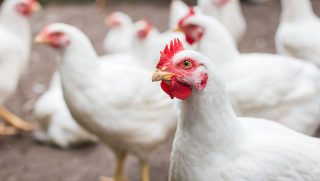American Farmland Trust, a nonprofit organization with over 40 years of experience in helping farmers, ranchers, and others in agriculture maintain and preserve their farmland, is helping veterans transition into the agricultural sector through their Brighter Future Fund (BFF) grant program. The Brighter Future Fund provides direct support to farmers and ranchers across the country.
In 2022, the fund began prioritizing funding for farmers who identify as BIPOC, Veterans, LGBTQIA+, and beginning farmers who had limited access to financial resources in the past.
Veterans had long been an overlooked demographic in agriculture and only began to be counted in official government data during the 2017 Census of Agriculture.
At that time, 351,647 men and 18,972 women claimed the title U.S. veteran while serving their nation as producers of agricultural products ranging from corn and beans to cattle and hay. A total of 7,996 served as herd managers for farms, and 264,240 lived on the farms they operated. Of the group, 192,993 listed farming as their primary occupation.
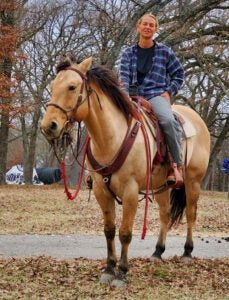
Two recipients of Brighter Future Fund grants — Bobbi Smith of RockinBarBRanch and Nathan Fielding of Fielding Family Farms — spoke about their military service, how they came into the farming sector, and what the BFF grant means to them.
Smith, an Army veteran, was introduced to agriculture at a young age when she began working on a horse ranch as a teenager. After working on several farms that went under due to lack of financial support, Smith said she had “the realization that a business plan inclusive of multi-streams of revenue was a requirement in making the venture self-sustaining.”
With this in mind, Smith operates the multi-faceted RockinBarBRanch in Cumby, Texas, raising cattle for beef production and hosting various camping sites and other agritourism offerings.
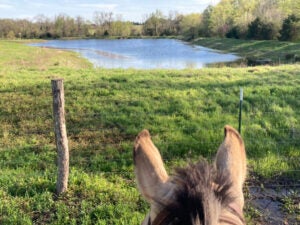
When she joined the Army in 1995 as a civil affairs officer, Smith gained more exposure to agriculture through ag-centric projects based in Afghanistan, where she was deployed twice, from 2005 to 2006 and then again from 2010 to 2011.
During her time overseas, she learned that she could also be a military contractor, and decided to fulfill military contracts between her deployments to save up capital for her own farmland.
Smith purchased the land that would become RockinBarBRanch in 2014 and continued working as a military contractor until 2019, deciding to end her military service and focus on her ranch full-time.
Located about 65 miles northeast of Dallas, Smith knows that she can draw a crowd of urban residents interested in the farming experience and hopes that her ranch can provide food, education, and experiences for those looking for it.
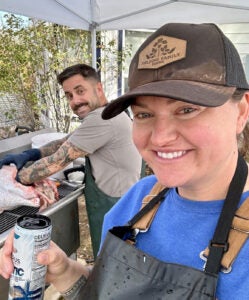
Nathan Fielding, who is actively serving in the Army as a mobility officer, first became curious about farming through chickens. Growing up as a suburban kid, Fielding never had an opportunity to rear his own poultry. When he and his family moved to a more rural area outside of Fresno, California, in 2017, he decided to try his hand at keeping his own chickens.
During the COVID-19 pandemic, Fielding began watching a lot of homesteading videos and learning more about where food comes from. He and his wife, also a military veteran, wanted to dive into the world of food production and bought more meat chickens as well as some goats for milking.
Even though Fielding had never reared chickens before, the process was immensely satisfying for him.
“I enjoyed the process of watching these chickens grow,” he said. “I know everything that bird has eaten since it’s been here, seen it on fresh ground every day, and thought to myself, this is awesome!”
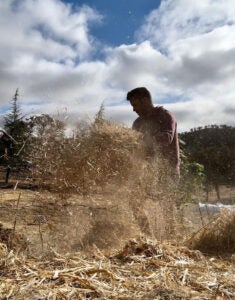
As both Fielding and Smith knew, operating a farm and maintaining their farmland was a costly affair, and as relatively new farmers, both sought out opportunities to earn grants and additional funding to help support their business.
For Smith, she learned of the Brighter Future Fund through a magazine she saw at a Tractor Supply store, which has been a financial supporter (along with Tillamook and other entities) of the BFF since 2020.
Collectively, these organizations, plus individual American Farmland Trust supporters, have provided over $4.5 million in grants directly to over 2,000 farmers nationwide.
Smith became one of these farmers this year, earning $5,000 to restore a 5-acre lake on her property that had dried up in 2014. When Smith purchased the land, she was not aware of the poor design of the lake, and record rainfalls in 2014 washed away the culvert that helped fill the lake.
The loss of this culvert led to inadequate water distribution at the lake, and it eventually dried out, resulting in the loss of native wildlife. Smith wanted to restore the lake both for environmental conservation purposes as well as offer a fishing/duck lease for hunting purposes and as an aesthetic feature for campers looking to stay at her farm.
With the Brighter Future Fund grant, Smith was able to purchase another culvert, hire a bulldozer/operator to redesign the culvert placement and restock the lake with some fish and crayfish. By restoring the lake, Smith is able to preserve the landscape of her farm as well as boost revenue generation by expanding the options available on RockinBarBRanch.
“I feel truly grateful for everything,” said Smith.
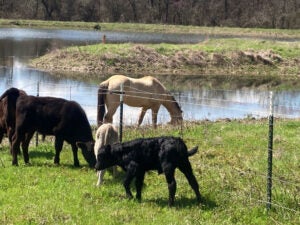
Having seen farms and ranches she worked at in the past struggle financially, Smith knows just how valuable the money from the Brighter Future Fund really is. She also appreciates that AFT was able to award her the amount of money that she needed for her project.
“I had applied for other grants … and for one, I was awarded an amount that was significantly less than what I needed for the project I pitched,” said Smith. “I had to completely change my plans. … And I wondered why I wrote that business plan, that enterprise, when [the committee] didn’t read it?” she said.
As more farmers operate on thinner profit margins, the aid and funds organizations like AFT provide need to be of significant scale to truly help and assist farmers with their needs.
The Fund is making a difference for Fielding as well, who hopes to scale up his operations on Fielding Family Farms and improve soil health on his land for future generations.
Fielding received $4,750 from the Brighter Future Fund and plans on using the funds to purchase materials to cross fence his property to better manage grazing of his livestock, running his chickens behind his goats so that his whole farm can work together in unity to increase soil health.
“I was surprised that I got it,” said Fielding. “I applied, not expecting to get it. … [Winning it] is amazing, as I’m able to do this big project that I wouldn’t be able to do on my own, and it’s freed up other money for other projects.”
Other projects include more chicken-rearing equipment, such as a movable chicken coop, and cover cropping with crops like daikon or radish to decompact their rocky soil and help their grass last longer.
“Right now, building soil is the number one issue,” said Fielding, who notes that the basis of a good farming operation is having healthy, resilient soils.
Eventually, Fielding hopes to have a robust chicken production operation and consistently be able to produce fruits and vegetables to sell at a farmers’ market.
“The more self-sufficient we are with our food, the better,” he said.
As veterans, both Smith and Fielding spent many years in service to our country, and they hope to continue a successful transition into the agricultural sector.
They were able to sustain and expand upon their operations with the Brighter Future Fund provided through American Farmland Trust.
To ensure that future veteran farmers can have the aid they need to transition from serving our country in the military to serving our nation by contributing to our food supply, please consider donating here to American Farmland Trust’s Brighter Future Fund.
This article was published on AGDAILY on behalf of American Farmland Trust.
American Farmland Trust’s Brighter Future Fund provides grants to help farmers nationwide improve farm viability, access, transfer or permanently protect farmland, or adopt regenerative agricultural practices. In 2022, the fund began prioritizing funding for farmers who identify as BIPOC, Veterans, LGBTQIA+ and beginning farmers who had limited access to financial resources in the past. Since 2020, AFT, with the support of Tillamook, Tractor Supply, and others, has provided approximately $4.5 million in grants directly to more than 2,000 farmers nationwide. Learn more and contribute here.





